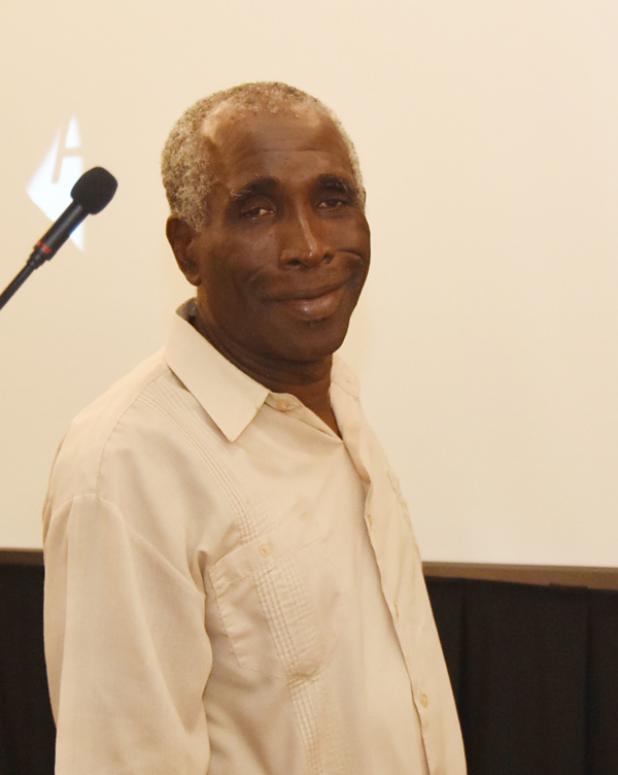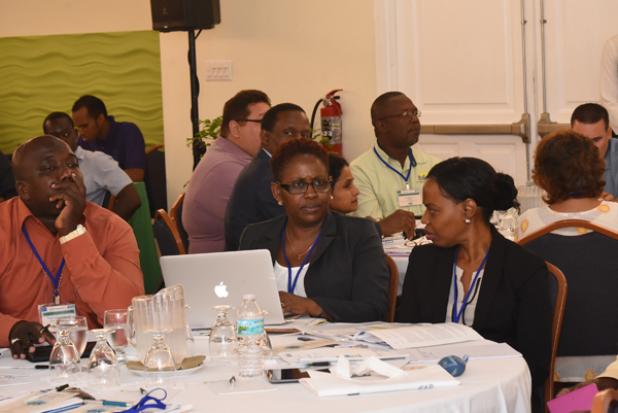
Permanent Secretary in the Ministry of Agriculture, Food, Fisheries and Water Resource Management, Esworth Reid.

Some of the participants attending yesterday’s Regional Validation Workshop of Model Agricultural, Health and Food Safety Bills.
PS Reid calls for deeper regional cooperation
DEEPER and more meaningful co-operation must be the order of the day for countries in the CARICOM region.
That’s the view of Permanent Secretary in the Ministry of Agriculture, Food, Fisheries and Water Resource Management, Esworth Reid. He spoke of this need as he lamented the length of time it has taken for CARICOM Member States to look at model legislation for Agricultural, Health and Food Safety Bills.
His comments came as he delivered the feature address yesterday morning at the opening ceremony of a Regional Validation Workshop of Model Agricultural, Health and Food Safety Bills, at the Radisson Aquatica Resort, which is part of the 10th European Development Fund Sanitary and Phytosanitary Measures Project.
The Permanent Secretary (PS) said it is unfortunate that Member States of CARICOM have had to wait more than four decades after the signing of the Treaty of Chaguaramas to be reviewing such model legislation for the region, with the hope of actually putting legislation in place to better facilitate regional and international trade in agricultural products. Questioning what caused this delay, the Permanent Secretary also queried if the political establishment and the major economic players in the countries of the region are truly serious about the economic integration movement.
“For over four decades now, numerous regional meetings were held, and there has been much talk by leading politicians and senior government officials in the region about the benefits to be gained from economic integration and the deepening of economic co-operation. Protocols were drafted and ambitious agreements were made, but only thus far; much of them did not take shape as they should have in reality,” he said.
He made the point while lamenting that a true single market and economy has still not been formed, suggesting that the spirit of integration and economic co-operation still leave a lot to be desired. To that end, he maintained that for the countries in the region to make positive and sustainable strides in achieving international competitiveness, sustainable economic growth and economic stability at the national and regional levels, the final decision makers must move beyond just drafting agreements and shaking hands, and begin to actively honour the agreements that are created. But, he made it clear that the region does not have to move towards or become a political union or a federation for there to be meaningful economic co-operation or political co-operation.
Turning his attention to regional agriculture, suggesting that it is an area in which the region can co-operate, the PS noted that there has been a significant decline in the agriculture across CARICOM, as well as the contribution the sector has been making to the gross domestic product (GDP). Using Barbados as an example, he noted that while in the 1970s and 1980s agriculture made up as much as 30 per cent of the national GDP, it now accounts for less than three per cent. At the same time, he said the food import bill has been on the rise.
As such, Reid is confident that the region has the potential to be self sufficient in food and that the agricultural sectors of the region are still potentially major foreign exchange earners. (JRT)
